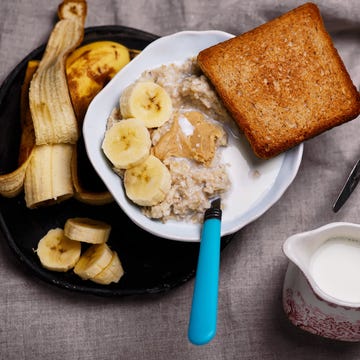In the world of nuts, pecans are up there as a firm favourite among runners – and for good reason. Among other benefits, they offer a solid dose of plant-based protein and a delicious flavour when added to dishes. Versatile and tasty, pecans also contain several key nutrients – including fibre, copper, thiamine and zinc – and can help to improve your blood sugar levels and your heart and brain function.
But that’s not all. Thanks to the findings of a new study published in The American Journal of Clinical Nutrition, there’s one more reason to add pecans to the top of your snack list: they could help to lower your cholesterol.
Since high cholesterol is linked to serious health complications like heart disease and stroke, this is news worth paying attention to. So, here’s what the study discovered – and what it could mean for your diet.
What everyone's reading
What did the study find?
Researchers conducted a randomised controlled trial of 138 participants. Here, the participants either consumed 57g of pecans a day in place of their usual snacks or continued to eat their usual daily diet.
5After 12 weeks, the researchers discovered that people in the pecan-eating snack group lowered their total cholesterol by about 8.1mg/dL (milligrams per decilitre, which is a unit used to measure the concentration of substances). Compared to those who didn’t eat pecans, those in the pecan-eating snack group also had drops in their low-density lipoprotein (LDL, or ‘bad’) cholesterol, non-high-density lipoprotein (HDL, or ‘good’) cholesterol, the ratio of total cholesterol to HDL cholesterol and triglycerides (a type of fat in the blood). In total, that marks a total cholesterol reduction of about 3.75% – and for LDL-C, a reduction of about 6.6%.
It’s worth noting, though, that participants in the pecan group gained more weight than those in the regular diet group.
How do pecans impact cholesterol levels?
Although the study itself didn’t explore how pecans may help to improve cholesterol, experts have weighed in to share their thoughts.
As noted by Kristina Petersen, the study’s co-author and an associate professor in the Department of Nutritional Sciences at Penn State University in the US, pecans contain unsaturated fats, fibre and plant sterols, which are known to lower blood cholesterol levels. She also points out that, in the study, pecans ‘displaced’ less healthy snack foods, allowing people to focus on healthier choices.
Dietician Jessica Cording, author of The Little Book of Game-Changers, adds that pecans contain high levels of soluble fibre, which binds to cholesterol in the stomach and helps to escort it out of the body. ‘That fibre is very helpful for managing cholesterol,’ she says.
In addition, pecans are rich in oleic acid, which is a form of unsaturated fat that’s linked with lower LDL and HDL cholesterol. ‘Generally speaking, oleic acid is considered heart-healthy,’ continues Cording.
As if that wasn’t enough, pecans also provide polyphenols and antioxidants, which can help to protect your cells from oxidative stress – an imbalance of free radicals and antioxidants in the body that leads to cell damage. As Cording says, this indirectly impacts your cholesterol. ‘If your cells have undergone a lot of damage from poor diet, a sedentary lifestyle and stress, your body isn’t going to work as efficiently,’ she says. ‘But eating an antioxidant-rich diet helps your cells by extension and helps the body to do things more efficiently, including clearing fat from the food that we eat. This can be reflected in cholesterol numbers.’
How many pecans do you have to eat to see benefits?
According to Petersen, try to aim for around 57g of pecans a day, which is about two medium handfuls.
How else can nuts boost your health?
Nuts of all kinds – not just pecans – are an excellent source of plant-based protein and a heart-healthy food, says Cording.
They’re also dense in nutrients and highly adaptable, giving you a lot of bang for your eating buck, adds Petersen. ‘Nuts can be incorporated into the diet in many ways,’ she says. ‘For example, they could be eaten plain as a snack, added as a topping to porridge, breakfast cereal or yogurt, or used as a plant protein alternative to meats.’
If you’re looking to ramp up your diet, continues Cording, ‘nuts a great way to add nutrition to a meal’.













